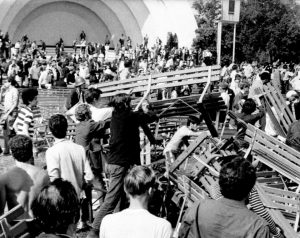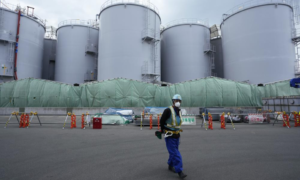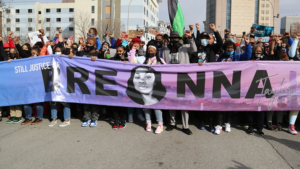Moscow’s efforts to delegitimize Ukrainian independence and national identity are not limited to state propaganda and political pronouncements, but also pervade the Russian school system, according to a new study of Russian and Ukrainian textbooks.
Following a review of 12 textbooks from the Russian and Ukrainian national curricula published between 2015-2021 – a period covering most of the Russo-Ukrainian conflict prior to this year’s full-scale invasion – the Jerusalem-based Institute for Monitoring Peace and Tolerance in School Education (IMPACT-se) concluded that Russian educational materials “are full of unsubstantiated, one-sided statements about the Ukrainian people and their government.”
Consistent with Russian messaging since the outbreak of war in 2014, and especially since this February’s invasion, Russian educational messaging portrays President Vladimir Putin and Russia as “saviors of the Ukrainian people,” the report found.
Ukrainian nationalism, it added, is frequently “described as being an extension of Western interests, rather than as a legitimate national sentiment” and Russian textbooks “cite Ukraine’s involvement in the Holocaust to claim that Ukrainian nationalism is inextricably linked with Nazism.”
“Russia depicts Ukrainians as having a separate identity only as part of the Soviet Union,” IMPACT-se CEO Marcus Sheff told Haaretz.
“Russian students are not encouraged to think critically about Ukrainian nationalism. Ukrainian textbooks strive for objectivity but notably, fail to mention atrocities perpetrated by Ukrainians during the Holocaust, including the Babi Yar massacre of Jews and to explain Ukrainian collaboration with the Nazi regime.”
According to researcher Anatoly Petrov, who examined the Russian textbooks for the study, the Russian authorities are on a “big mission of the dehumanization and demonization of the Ukrainian people” so “it’s not surprising that it’s the same in the textbooks.”
- The link between the history of vodka and antisemitism
- The truth about Ukrainian nationalism and is it tainted by Nazism
- Almost 9,000 Ukrainian soldiers killed in war with Russia
“When a country has one official publisher for the textbooks, it’s very easy to have them under control word-for-word,” he said. “And of course this publisher is close to the government.”
Petrov cited several passages in which students were taught that the Crimean peninsula, which Russia annexed in 2014 following a referendum decried as a sham by most of the international community, had been neglected by Kyiv and that its residents had asked for Russian assistance following the 2014 Euromaidan revolution, in which “nationalist-minded forces” allegedly “carried out a coup d’état and seized power.”
The Russian media frequently paints contemporary Ukrainians as ultra-nationalists and followers of Stepan Bandera, a 20th-century Ukrainian nationalist whose followers killed tens of thousands of Poles and Jews during World War II. Ukrainian officials have repeatedly insisted that he and his men were not responsible for war crimes.
According to historians, Bandera’s followers in the far-right Organization of Ukrainian Nationalists, and its paramilitary wing, the Ukrainian Insurgent Army, engaged in a campaign of ethnic cleansing against Jews and Poles during the World War II.
The Ukrainian government launched a major campaign to rehabilitate OUN and UPA in the wake of the 2014 Russian annexation of Crimea, although Kyiv has dialed down the glorification efforts since the election of Jewish comedian-actor Volodymyr Zelenskyy as president in 2019.
In this spirit, while Ukrainian textbooks are generally more historically accurate than their Russian counterparts, they contain scant acknowledgment of OUN-UPA crimes and “collaboration with the Nazi regime is explained as a choice intended only to achieve the goal of restoring an independent and sovereign Ukraine,” the report found.
According to Maria Sokolovsky, the researcher who examined the Ukrainian textbooks, there was “a lot” of glorification of Bandera, who was presented as “just a person who was very pro-Ukrainian” whose “main goal and approach was just to free Ukrainian people.”
And at least one Ukrainian text claimed that up to 7.7 million Ukrainians died during the Holodomor – a famine that killed millions of Ukrainians in the 1930s that has been blamed on the policies of Soviet dictator Joseph Stalin.
Ukrainian nationalists have long compared the Holodomor to the Holocaust. And while most mainstream historians outside of Ukraine believe that somewhere on the order of 3 to 4 million Ukrainians died during the famine, Petro Poroshenko, who served as president during the period in which many of the texts studied were published, repeatedly asserted during his time in office that it had claimed 7 to 10 million victims.
“It has been said that in Russia it is not only difficult to predict the future, but also the past,” said Pinchas Goldschmidt, who was recently ousted from his position of Moscow chief rabbi after fleeing Russia in the wake of the invasion.
“Unfortunately, historical revisionism is taking place not only in Russia but also in Ukraine, and the saddest moment is that generations of children are being taught to hate and adjust history to current political objectives.”
John-Paul Himka, a historian and author of the book Ukrainian Nationalists and the Holocaust, told Haaretz that both countries needed to revise how they teach history to their children.
“Russia has to realize that the foundations of the Ukrainian national movement were laid by the emancipated serf Taras Shevchenko and the anarchist thinker Mykhailo Drahomanov – polar opposites of the Nazis [while] Ukraine has to come clean with its Holocaust history and not make a cult of wartime nationalists who killed Jews and Poles,” he said.




